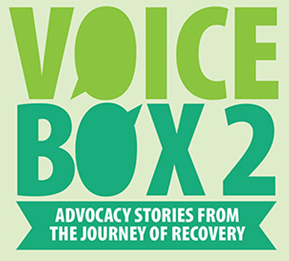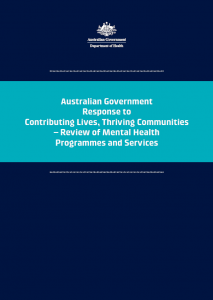151207-7522.jpg
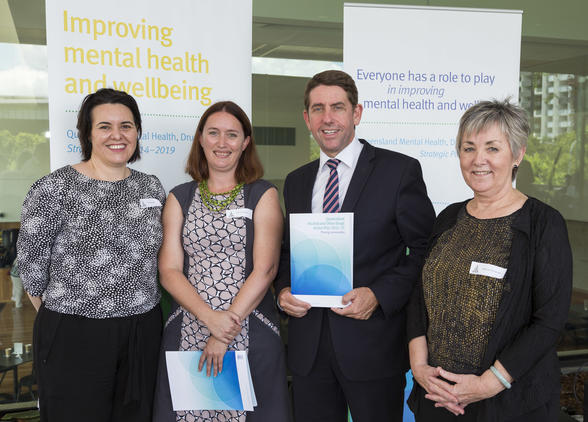
The Minister for Health launching the Queensland Alcohol and Other Drugs Action Plan 2015-17 with (left to right) Carmel Ybarlucea, Executive Director QMHC, Rebecca Macbean, CEO QNADA and Lesley van Schoubroeck
Commissioner's Update
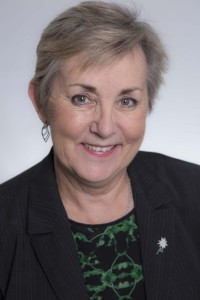
It’s December and we’re not done yet.
We’re very pleased to have released another Action Plan this week — that makes three this year, all part of the Strategic Plan family. We still have two more exciting pieces of work to unveil before the year draws to a close (also part of the family), so keep a look out for the Annual Implementation Report and benchmark performance indicators to measure our overall progress.
Action on alcohol and other drugs
Our thanks go to Minister for Health and Minister for Ambulance Services Cameron Dick MP for launching the Queensland Alcohol and Other Drugs Action Plan 2015-17 this week.
The Action Plan was informed by the views of over 200 stakeholders including people living with problematic substance use, their families and supporters. The support of QNADA has been invaluable to harness their voices, particularly those of service users and front line alcohol and drug workers.
Together their input has made this a powerful piece of work.
Council news
It was great to see so many leaders in mental health, alcohol and other drugs, the government and community sectors come together with the Advisory Council to launch the latest Action Plan and celebrate the achievements of 2015.
The event also brought the opportunity to farewell Professor Harvey Whiteford after announcing his resignation as Chair of the Council to take up an exciting opportunity with the United Nations. Harvey served as our inaugural chair and has brought together the diverse perspectives of Council members to provide advice to the Commission on reform in Queensland.
I thank Harvey for his service and support and wish him all the best in the future.
Willing to Work submission
On International Day of People with a Disability we made a joint submission with the Anti-Discrimination Commission Queensland to the Willing to Work National Inquiry into employment discrimination against older Australians and Australians with a disability. In our submission we look at the barriers people with disability, including mental illness, experience in getting and keeping a job, and solutions to these barriers. It shouldn’t be so hard.
Health promotion submission
Last month the Commission made a submission to the Parliamentary Inquiry into the establishment of a Queensland Health Promotion Commission. We commented on the potential role and scope of the Commission and gave examples for establishing collaborative, whole-of-government approaches. Read our submission
Thank you
As yet another busy year comes to a close, I would like to express my appreciation to all those who have contributed to the work of the Commission during 2015. Your participation is greatly valued.
It’s my aim to try to personally meet with as many of you as possible, but this is not always feasible. We have produced a short video to cap off the year and to thank you for your support. Watch the video
Be safe and well over the holiday period. Best wishes, Lesley
Action on alcohol and other drugs
Queensland Alcohol and Other Drugs Action Plan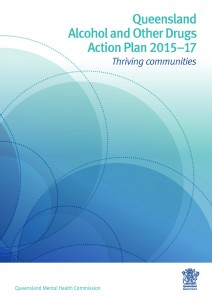
Not everyone who uses alcohol, tobacco and other drugs will experience harm or become dependent. When harm does occur however, it can have wide-ranging impacts on the mental and physical health of individuals, their families and communities. The economy is also impacted through increased demand on government and community services and lost productivity.
- Queenslanders continue to drink alcohol at risky levels and smoke cigarettes at levels exceeding other Australians.
- Forty per cent of Queenslanders engage in single-occasion risky drinking, with one-third of young adults (late teens to 20s) drinking 11 or more standard drinks on a single occasion, placing them at very high risk.
- Alcohol is responsible for just under half of all overdose ambulance call outs and is the most common contributing factor to fatal road crashes.
While agencies are acting to improve responses and address impacts, only so much can be done without a change in culture and attitude towards drinking, smoking and using other drugs. Excessive drinking needs to become socially unacceptable, much like smoking is now less accepted.
The whole-of-government Queensland Alcohol and Other Drugs Action Plan 2015–17 aims to prevent and reduce the adverse impacts of alcohol and other drugs on the health and wellbeing of Queenslanders. It contains 54 actions by Queensland Government agencies under three priority areas — demand reduction, supply reduction and harm reduction.
The National Ice Strategy released by the Australian Government on 6 December increased funding to treatment services which will complement actions under the Action Plan.
Read the Queensland Alcohol and Other Drugs Action Plan 2015-17 and media release 'Queensland’s binge drinking leading harm'
Employment discrimination
Willing to Work
Having a job is one way people living with disability, including mental illness, can remain connected and live a life with purpose.
The Commission combined forces with the Anti-Discrimination Commission Queensland on a joint submission to the Willing to Work National Inquiry into employment discrimination against older Australians and Australians with a disability.
Our submission aims to be practical and looks at the barriers people with disability, including mental illness, experience in getting and keeping a job, and solutions to these barriers. Providing real-life examples, it demonstrates the impact of these barriers on workers and jobseekers.
Thank you to everyone who shared their views and experiences with us. Everything we heard from you we considered in the development of our submission.
What’s in it?
Suggested solutions include:
- Review the Disability Employment Service towards individual needs and gear payments towards better job matching for long-term job retention.
- Provide positive models of people living with disability or mental illness via contact based education strategies, for example through traineeships and structured work experience programs.
- Create new types of jobs through social enterprises, via start up grants, social procurement and ethical investment initiatives.
- Support employers to design innovative ways to create jobs for people with disability or living with mental illness.
- Generate employer demand via better marketing of employment services and incentives, and specialised labour firms.
- Affirmative action policies, consideration of legislated employment quotas for larger employers, and increasing the number of jobs in the public service.
Read it
Read the joint submission in full and the media release ‘Opportunity, imagination, innovation key to jobs for people with disability’
Lived Experience
Medication and mental illness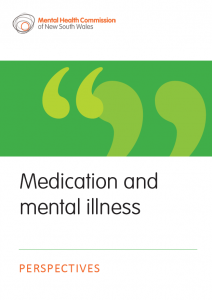
A New South Wales Mental Health Commission paper about medication and mental illness highlights the important role of lived experience in improving clinical treatment. It includes real examples and commentary from consumers and carers experiencing the good and the not so good reality of psychotropic medication use.
Hear first-hand from consumers and carers about their experiences of medication to treat mental illness by reading the paper or watching the accompanying video here
Advocacy stories from the journey of recovery
Watch a series of inspirational and thought provoking stories on personal experiences of living with mental illness and advocating for change and greater understanding in a series of videos released by Partners in Recovery Gold Coast.
With an aim to raise awareness and community understanding, the videos are available to community and health service providers for showing in waiting rooms and on other public TVs.
Watch the videos online or request a DVD on the PIR Gold Coast website
National reform
Changes to the Australian mental health system announced
The Federal Government has announced changes to Australia’s mental health system through a response to the National Mental Health Commission’s review of mental health programmes and services Contributing Lives, Thriving Communities.
The response aims to transform Commonwealth mental health funding and leadership over the next three years to achieve a more efficient, integrated and sustainable mental health system and to improve mental health service delivery for Australians. It outlines nine areas of reform in areas including child and youth mental health, suicide prevention, enhanced primary care through locally-led services, a new digital mental health gateway and a stepped-care approach to mental health services to name a few.
An article in The Canberra Times ‘Mental health: implementation the key to structural reforms’ provides good commentary on the Government’s response and announced reforms.
Read the full Australian Government response
Council update
Last meeting
The Council held their last meeting for the year, looking back on their achievements in 2015 and potential areas of focus in 2016. Professor Harvey Whiteford thanked Council members for their support and contribution over the last two years after announcing his resignation as Chair of the Council.
Meeting communique coming soon.
New opportunity
With Professor Whiteford’s departure as Council Chair, an opportunity arises for a new Chair to bring renewed energy to the Council in 2016.
Applications are now open, but be quick – applications close Monday 21 December.
Get the application and information package on Smart Jobs
Spotlight on Amelia Callaghan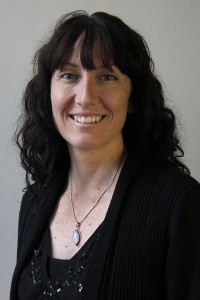
During an 18 year career in mental health and alcohol and other drugs services across clinical and management positions, Amelia has advocated for the interests of people with mental health issues and problems with substance use at both the individual and broader systemic levels.
Amelia is passionate about the many issues impacting on young people and children’s mental health and wellbeing. One of her main motives on applying to be a member of the Council was to advocate for holistic, coordinated, early intervention services that promote good mental health and wellbeing.
Amelia says “Because of their potential to impact positively on the mental health of young people, as a member of the Council I have particularly enjoyed participating in consultations to develop the action plans Queensland Suicide Prevention Action Plan and Early Action: Queensland Mental Health Promotion, Prevention and Early Intervention Action Plan. During my term as a Council member I have also been fortunate to host a consultation with the Commissioner and a group of young people on their experiences of the mental health system in Queensland.”
Sector News
Grants
- Disability housing in Brisbane’s North – Organisations can apply for $800,000 in funding to construct, or purchase and modify housing in the Brisbane North area to provide a safe environment for people with high and complex disability support needs and their carers. Apply for funding
- Volunteer grants 2015 – Community organisations are invited to apply for grants up to $5,000 under the Strengthening Communities – Volunteering sub-activity. Applications close 9 December. More information
- Ian Potter Foundation Community Wellbeing Grants – Grants are available for innovative activities or programs which enhance the wellbeing of the community, or which alleviate homelessness or other disadvantage arising from poverty or other causes. Applications close 11 December. More information
- Ian Potter Foundation Health and Disability Grants – Funding applications are open for innovative programs that enhance the lives of people with disability or chronic illness and/or promote the health of the community. Applications close 11 December. More information
- Brisbane City Council Men’s Shed Grants Program – Grants up to $20,000 are available to support the establishment and development of Men's Sheds in Brisbane. Submissions close 14 December. Apply
- Brisbane City Council Housing Support Program – Up to $10,000 in funding is available to community organisations for projects or services that respond to the housing and social needs of homeless people in Brisbane's inner north. Applications close 14 December. Apply
- Whole kids small seeds – Grants are open until 31 December for organisations and groups to develop creative and innovative solutions to root-cause problems in local communities. Projects that primarily support children 12 years and under and aim to deliver positive impacts in a range of areas, including children’s mental health and wellbeing, are encouraged to apply. More information
- Poverty and disadvantage capacity building program – Grants for capacity building are available to community-based and not-for-profit organisations that are working with young people aged 12 to 23 years living in or transitioning out of out-of-home care. Find out more
- John Wallis Foundation – Individuals or organisations can apply for grants to develop local projects supporting socially or geographically isolated individuals and groups. Applications close 22 January 2016. More information
- The Lord Mayor's Suburban Initiative Fund grants program – Applications up to $10,000 are available to community projects which contribute to the Brisbane Vision, by helping to achieve the aspiration to be a friendly and safe, active and healthy, clean and green or vibrant and creative city. More information or apply here
- Rental grants are available through the Queensland Government for people in a housing crisis. More information about eligibility and how to apply is available on the website
Resources
- New Australian consumer website – The website aims to give mental health consumers a national voice. Visit the website
- LGBTI drug use, mental health and sexual health – A new website provides the LGBTI community with information on drug use, mental health and sexual health. Visit Touchbase
- Lifeline Service Finder app – A free app for iPhone or iPad to find local and national low or no cost support services within Australia. Download the app
- What works in promoting social and emotional wellbeing and responding to mental health problems in schools? – This Advice for Schools and Framework Document covers two overlapping areas of school practice: promoting positive social and emotional wellbeing for all in schools, and tackling the mental health problems of pupils in more serious difficulty. Download the document
- Videos for children of parents with a mental health condition – A series of short video clips have been released for young people aged 10 and up to help explain the signs and symptoms of anxiety, depression and other mental health conditions their parents may experience. Watch the videos
- What is alcohol and drug treatment? – This resource explains in simple, non-medical language the different types of drug and alcohol treatment, how to access treatment services, support available for friends or family, and other commonly asked questions. It is suitable for clients with low English literacy, people not familiar with health and treatment systems, migrants, refugees and asylum seekers. Download the resource
- The economic cost of suicide and suicide behaviour in the Queensland Construction Industry – report released by Mates in Construction. Read the report
Events
- 18 December School of Hard Knocks Christmas Celebration Concert – Join the School of Hard Knocks for their annual Christmas Concert at the State Library of Queensland. Book your ticket
- 28 January 2016 ASCA Trauma Training ‘Principles in Practice’ – This one day interactive workshop shares insights and learnings from current research and clinical best practice to provide participants with new skills for working with adult survivors of complex trauma. More information
- 17-18 February 2016 ASCA Trauma Training ‘Working therapeutically with people who have complex trauma histories’ – This two day interactive workshop provides participants with the knowledge and practice framework to enable them to establish safe, supportive, therapeutic relationships with people affected by abuse, neglect and/or attachment trauma. More information
- 18-19 February 2016 Annual TheMHS Summer Forum – Sydney. The topic for discussion during this 2-day conference is Cracks in the ice? Illicit drugs and the mental health impact on our communities. Early bird registrations are now open
Surveys
- Health in Focus – CheckUp’s annual survey provides an opportunity to have a say on your experiences with the healthcare system. The survey is open to health professionals and members of the public until 23 December. Take the survey
Give your feedback
Take five minutes to give us your feedback! Evaluate:
Queensland Mental Health Week 2015
Queensland Alcohol and Other Drugs Action Plan 2015-17
Queensland Suicide Prevention Action Plan 2015-17
Ordinary Report Social Housing: Systemic issues for tenants with complex needs
